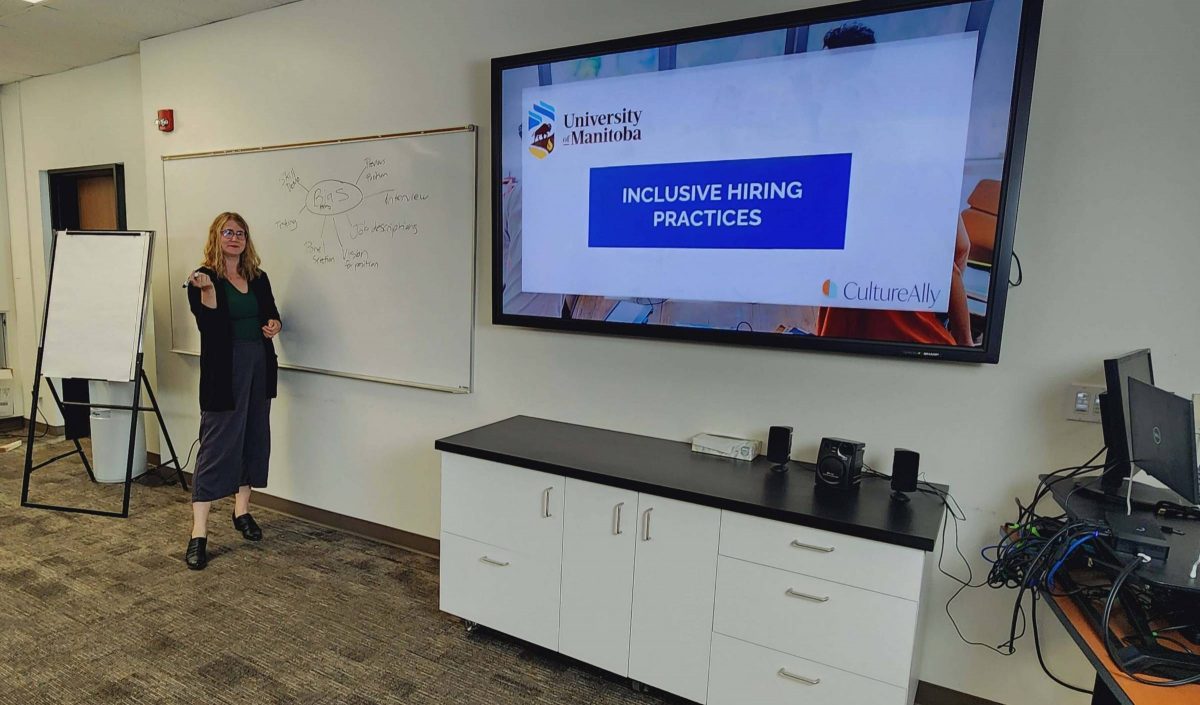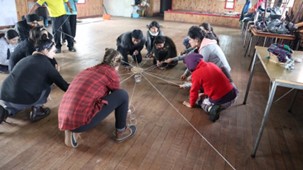
Learning and Organizational Development facilitator, Loie Gervais, leads a session of the Inclusive Hiring Practices workshop. The workshop was developed with support from the 2023-2024 Strategic Initiatives Support Fund.
Strategic Initiatives Support Fund projects generate momentum for UM’s strategic mission
SISF 2024-2025 recipients announced
The Office of the Provost and Vice-President (Academic) is pleased to announce 35 projects awarded funding, totaling over $2.2 million, through the Strategic Initiatives Support Fund (SISF). The selected projects, dedicated to supporting creative ideas and initiatives that advance the goals outlined in UM’s new strategic plan, MomentUM: Leading Change Together, come from twelve faculties and eight administrative units from across the university.
“We were once again excited to see tremendous enthusiasm for this initiative,” says Diane Hiebert-Murphy, Provost and Vice-President (Academic). “We received over 60 applications from a variety of academic and administrative units. The quality of ideas put forward and the collaborative nature of the projects reflect our stated vision to boldly lead change together.”
SISF targets small-scale short-term projects, ranging in cost between $10,000 and $100,000 which could be completed by March 31, 2025. A complete list of funded projects is available on the Strategic Initiatives Support Fund intranet page. We look forward to sharing more with the community on the outcomes of these projects as they move us forward in creating knowledge that matters, empowering learners, and reimagining engagement.
Celebrating our progress: Project outcomes from SISF 2023-24
As the newly funded projects get underway, many projects from last year’s SISF fund have been completed. While their strategic goals were aligned to UM’s previous strategic plan, the project outcomes nonetheless drive us forward toward many common priorities. Here are three examples of impact from the SISF 2023-24.
Project: Inclusive Hiring and Hiring in Good Ways
Lead unit: Human Resources
UM aspires to create belonging rooted in human rights and dignity of all. This vision is reflected in our current and previous strategic plans, as well as other guiding documents such as the President’s Task Force on EDI report and the Indigenous Senior Leadership Report. This project contributed to those efforts to build an outstanding learning and working environment for all, and specifically, to create pathways for Indigenous achievement.
The Human Resources department partnered with CultureAlly to enhance Equity, Diversity, Inclusion (EDI) and Indigenization and De-colonization in its hiring and retention processes. The EDI consultant provided an external perspective on UM hiring practices, identifying gaps and highlighting strategies to engage, hire and retain diverse talent.
The project led to the development of two workshops relating to hiring staff, “Inclusive Hiring Practices” and “Hiring in Good Ways.” The “Inclusive Hiring Practices” workshop was rolled out this spring, with six sessions offered. The training leads participants in exploring their implicit bias and how it can impact decision making, as well as teaching mitigating tactics and strategies to address bias in the hiring process.
“Many of the workshop attendees commented on the importance of this opportunity to learn about practical steps and the resources available to support those involved in hiring to follow inclusive practices,” says Sandra Woloschuk, associate director, Learning & Organizational Development. Additional in-person sessions will be offered this Fall term and an on-line self-directed version of the workshop is being developed. Watch for upcoming offerings of the workshop on the Learning and Organizational Development intranet page.
The second workshop, “Hiring in Good Ways,” currently in development, will emphasize the importance of addressing discriminatory practices in hiring that specifically impact Indigenous candidates. Together, these trainings will provide a foundation of knowledge that supports UM’s institutional efforts for consistent and widespread integration of inclusive hiring practices.
Project: Period Poverty and Equity, on Campus and Beyond
Lead units: Faculty of Arts and the Centre for Human Rights Research
The “Period Poverty and Equity” project brought together a collaborative team of faculty and staff to address the issue of period poverty, period equity and menstrual stigma. The research team describes the experience of menstruation as an issue of discrimination due to the financial burden posed by the need for menstrual supplies.
The project, involving members from the Faculty of Arts, Faculty of Social Work and the Office of Sustainability, set out to identify barriers and advocate for equitable solutions for period equity. It aligned with strategic goals to create an outstanding learning and working environment and to forge connections for high-impact community engagement.
The research team conducted a physical audit of all sources of menstrual supplies on UM campuses and an online survey to understand the menstruation experience of UM students, staff and faculty. They also hosted several on-campus events, such as a panel featuring renowned experts on menstrual justice. Their final report outlined several recommendations, including that the University of Manitoba offer free menstrual supplies throughout its campuses. At this time the University is reviewing the recommendations.
Find the full report Period Poverty and Equity on Campus and Beyond.

Menstrual product dispenser in washroom. Photo credit: The Manitoban
Project: A Framework for Experiential Learning with-and-for UM Faculties
Lead unit: The Centre for the Advancement of Teaching and Learning
Building on previous commitments to build capacity and infrastructure for Experiential Learning (EL), this project worked to develop a framework to guide the development, integration and enhancement of EL across the university. Increasing EL experiences at UM is a central pillar of our strategic goal to inspire minds through innovative and quality teaching.
The Office of Experiential Learning held consultations with faculty and instructors aimed at creating a collective vision for Experiential Learning at UM. These consultations resulted in important dialogue across faculties and helped identify the barriers to integrating EL in academic courses from the faculty perspective. Though not yet fully developed, the consultations led to greater understanding of the systems, policies and supports required to implement an Experiential Learning Framework at UM.
In addition, the project led to the development of an EL Faculty Advisory Committee to increase faculty involvement in institutional-level EL initiatives, as well as membership growth in the EL Community of Practice.

Example of Experiential Learning. Project: Art, Community and Resistance 2019, Chiloe, Chile.
These projects are examples of the significant impact of our faculty and staff working together to advance our strategic priorities. Together, UM is making meaningful change in our province and the wider world.






